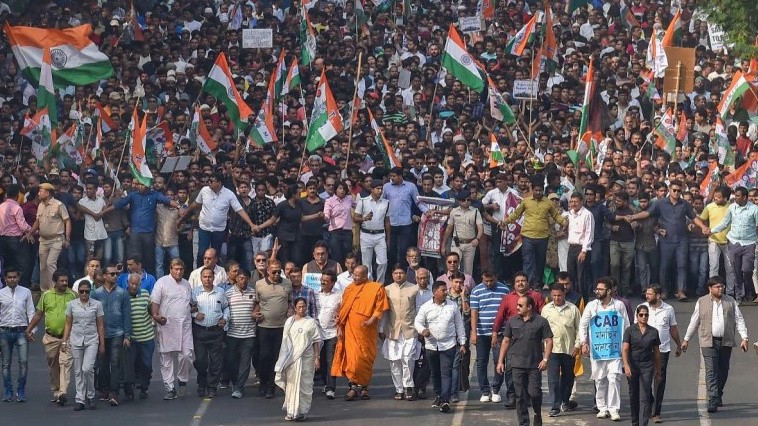On 11th December, India’s Rajya Sabha passed the Citizenship (Amendment) Act, 2019. The Act is directed towards providing Indian citizenship to minorities such as Hindus, Sikhs, Buddhists, Jains, Parsis and Christians from Pakistan, Afghanistan, Bangladesh. Anyone belonging to these minorities will be treated as citizens of India given, they began living in the country from or before 30th December, 2014. The problem here is that the minorities supported by the Act does not include Muslims.
Immediately after the bill was passed, the north eastern states of India, Assam and Tripura erupted into protests. West Bengal joined in too. So did students from a number of universities around India. Jamia Milia Islamia University (JMIU), Aligarh Muslim University (AMU), Jawaharlal Nehru University (JNU) and Maulana Azad University are some of the institutes where large scale protests have been going on. West Bengal Chief Minister Mamata Banerjee has refused to implement the bill in her state. Later Chief Ministers of Punjab, Kerala, Madhya Pradesh and Chhattisgarh followed her too. In Kerala, joint protests are being staged by ruling and the opposition parties. On 16th December, Mamata Banerjee led a 7 km march against CAB in Kolkata. Train travel between Kolkata, North Bengal and India’s North eastern states have been suspended. Thousand are protesting in Karnataka and Tamil Nadu. Internet has been shut off in a number of states.

Raging Assam and Tripura
While West Bengal is staging protests against the discrimination to be faced by the Muslim population, Assam and Tripura’s reasons are different. Assamese people are against refugees from Bangladesh being allowed to settle in their state. They see the immigrants as threats to their indigenous communities, their culture, language and tradition. The movement in Assam against Citizenship Amendment Bill (CAB) keeps growing. Clashes between the police and the demonstrators led to four people being shot down by the police. More than a thousand others have been detained. Curfew has been imposed in districts such as Guwahati and Dibrugarh.
BJP knew very well that Assam and Tripura would erupt in protest once CAB is passed. On 12th December, military and paramilitary troops were deployed in the two states. In an attempt to keep the Assamese happy, the BJP government in the beginning of 2019 awarded Assamese musician Bhupen Hazarika the Bharat Ratna. Bhupen Hazarika definitely deserves the award but the timing indicates strong political motive. Assamese artists have expressed solidarity with the protest. Singer Papon cancelled his show at Delhi on 12th December due to the unrest. Another of Assam’s popular singers, Zubeen Garg has not only slammed the government but is actively participating in the protests. Zubeen had previously composed election songs for BJP but he now stands for his state against the central government.
Universities turn into war zones
The students of Jamia Milia Islamia University (JMIU) and Delhi police clashed as the police tried to disperse the protestors near the university campus. The police then turned the university premises without permission, fired tear gas and beat up the students. “The police broke the lock of the library gate and entered inside and beat everyone who came in their way,”- Mohmmad Minhaj Uddin, a law student at the JMIU told Al Jazeera. The police also attacked the Jamia hostels. The students are traumatized. The university has suffered huge loss of property and equipment.
Police also used batons, fired tear gas in an attempt to disperse the demonstrators at Uttar Pradesh’s Aligarh Muslim University (AMU). AMU is India’s largest minority institution. 21 of its students were arrested by the police for vandalism. The university authority has asked all the residential students to evacuate the hostels. Students from institutes such as IIT-Bombay, IIT-Madras, Banaras Hindu University and Chandigarh University have started their own protests near or inside their campuses. Students from Chandigarh to Chennai stand in solidarity.
In its 2014 election manifesto, Bhartiya Janata Party (BJP) promised to ensure rights of Hindu refugees. The ruling party has kept its promise and while doing so it has passed an amendment that is a burning example of religious discrimination. BJP is on its way to establish a country based on Veer Savarkar’s ideology of Hindutva. Rahul Gandhi has described the CAA bill as a ‘weapon of mass polarization’.